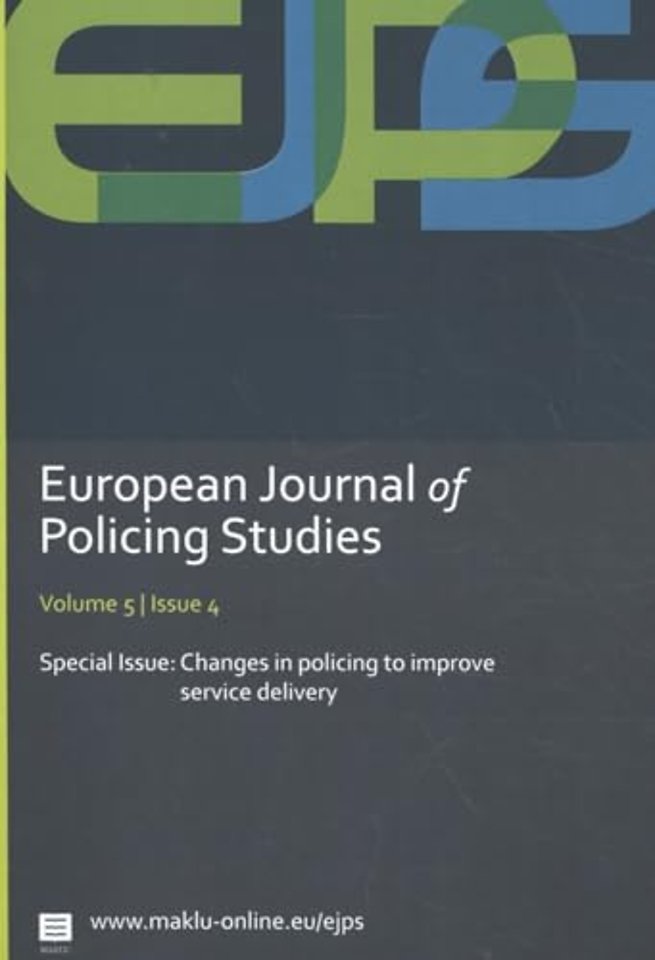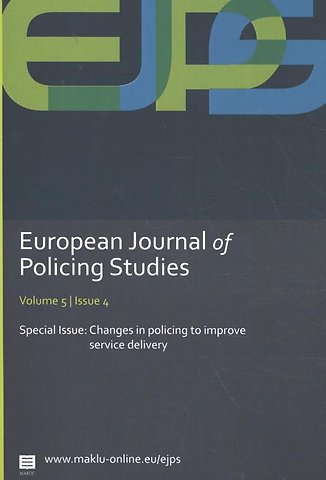European Journal of Policing Studies
Special Issue: Changes in policing to improve service delivery
Samenvatting
The purpose of this article is to provide an overview of the way in which the European Union has gradually but steadily built a security architecture based on the control of mobility and borders. Different logics of policing are interwoven in several projects, which are strongly interdependent with technological innovation. Furthermore, the European policing of mobility is primarily performed by mounting surveillance – both inside and beyond European borders – by means of which all forms of movement (transactions, travelling, etc.) are subjected to intensive monitoring by multiple actors who are interlinked through strategies and systems. The main finding is that border policing is shifting in a fundamental way from fixed to fluid, from territorial to virtual, and from physical to technological. Hence, paradoxically, though mobility is strongly promoted as one of the main virtues of the European Union, Europe’s precautionary protection may be at ill-ease with the free movement of people. The article seeks to stimulate the knowledge and debate about deeper shifts in Europe’s security apparatus and develops this from a law enforcement perspective.
In the German speaking academic world Police Science (Polizeiwissenschaft) is a fairly new and little known area of social science. Accordingly, the academic status of police science is anything but firmly established but rather at a ‘hybrid’ stage of development. The very combination of policing and academic study/research seems to remain largely incompatible not only to police managers but also to main stream sociology. German police science differs substantially from the Anglo-American-Australian approach. One main difference pertains to legal traditions, others are due to historical and cultural developments that will be taken up in this descriptive essay. However, Anglo-American-Australian police theories have a lot to offer to German and European police scientists and this will be demonstrated. For a future common approach to an evolving European police science similar descriptions will be required from other European countries to establish a comparative foundation of joint EU police studies. Some of the principal dimensions of such a comparison will be sketched in this essay. It concludes with a presentation of empirically based police studies carried out by instructors and Master students at the newly founded German Police University in Münster. Topics are media coverage of clashes between police and demonstrators, a typology of third party intervention in cases of assault in public places and COREPOL (EU FP7), a comparative security research project aiming at an improvement of police-minority relations through means of restorative justice programs.
Trefwoorden
Specificaties
Inhoudsopgave
Aims and scope 3
Antoinette Verhage, Lieselot Bisschop, Dominique Boels, Wim Hardyns & Kamila Medova
Changes in policing to improve service delivery 5
Garth den Heyer & Louise Porter
Challenges facing contemporary law enforcement: Enhancing public confidence and trust in the police by icorporating the ‘Left Realism’ theory of justice into modern criminal justice policies and practices 10
James F. Albrecht
Organisational learning from field research in policing: How police can improve policy and practice by implementing randomised controlled trials 28
Laura Bedford & Peter Neyroud
Is managerialism alive and well in the police service? 50
Alan Beckley
Recent developments in police governance and current issues surrounding police service delivery in England and Wales 72
Barry Loveday
Policing excellence and prevention first: A model for transforming police service delivery 90
Garth den Heyer
Transforming a para-militaristic police force to a human rights-oriented police service in a violent country: The South African challenge 109
Christiaan Bezuidenhout & Annalise Kempen
Changing stop and search in Scotland 129
Megan O’Neill & Elizabeth Aston
Anderen die dit boek kochten, kochten ook
Net verschenen
Rubrieken
- aanbestedingsrecht
- aansprakelijkheids- en verzekeringsrecht
- accountancy
- algemeen juridisch
- arbeidsrecht
- bank- en effectenrecht
- bestuursrecht
- bouwrecht
- burgerlijk recht en procesrecht
- europees-internationaal recht
- fiscaal recht
- gezondheidsrecht
- insolventierecht
- intellectuele eigendom en ict-recht
- management
- mens en maatschappij
- milieu- en omgevingsrecht
- notarieel recht
- ondernemingsrecht
- pensioenrecht
- personen- en familierecht
- sociale zekerheidsrecht
- staatsrecht
- strafrecht en criminologie
- vastgoed- en huurrecht
- vreemdelingenrecht








